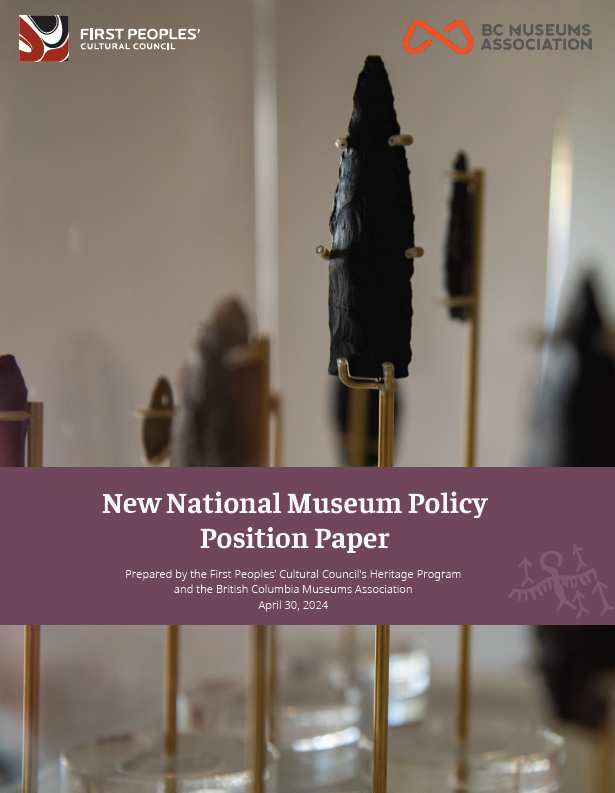National Museum Policy – Position Paper
Prepared by the First Peoples’ Cultural Council’s Heritage Program and the British Columbia Museums Association
Published: April 30, 2024
Executive Summary
This paper presents the collective position of the First Peoples’ Cultural Council (FPCC) and the British Columbia Museums Association (BCMA) on the urgent need for a new National Museum Policy (NMP) that centres on Indigenous rights and autonomy. This paper was developed in response to current work being undertaken by the Government of Canada to review and modernize the existing NMP, which was created in 1972 and last updated in 1990. FPCC and the BCMA have come together, walking alongside one another, to urge the Government of Canada to be fully engaged with and guided by the expertise of Indigenous Peoples, according to the principles of Free Prior and Informed Consent (FPIC) and in alignment with the United Nations Declaration on the Rights of Indigenous Peoples (UNDRIP), throughout the process of developing a new NMP.
The current NMP does not address key developments resulting from decades of Indigenous activism and advocacy, including UNDRIP, the Truth and Reconciliation Commission’s (TRC’s) 94 Calls to Action, the Calls for Justice by the Inquiry into Missing and Murdered Indigenous Women and Girls and the signing of the Declaration on the Rights of Indigenous Peoples Act (DRIPA) in B.C. Nor does it reflect recommendations flowing from the Task Force Report on Museums and First Peoples, the International Council of Museums (ICOM) Code of Ethics or the Canadian Museums Association’s (CMA’s) report Moved to Action: Activating UNDRIP in Canadian Museums. The federal government’s national engagement and review of the NMP is an opportunity for the Canadian government to make meaningful change by creating a more robust, influential and inclusive policy and protocols
respecting Indigenous heritage and Canadian museums.
What will this mean for future relationships between Indigenous Peoples, their heritage and museums? Within the context of existing museums, it means concrete support for Indigenous Peoples’ right to control the documentation, interpretation and representation of their cultures and heritage. Taking a more expansive view, Indigenous Peoples would have the infrastructure to house their belongings as appropriate to their distinctive laws and traditions. Museums would be places to celebrate and revitalize languages, arts, cultures and heritage. In these places, the belongings would be curated using systems of care that respect community legal traditions and protocols.
The BCMA and FPCC urge the Government of Canada to live up to its moral and legal obligations to uphold Indigenous Peoples’ rights to interpret, commemorate and control their heritage by ensuring that modernization of the NMP aligns with UNDRIP and allied laws and policies developed over the past three decades. This cannot be accomplished without Indigenous Peoples’ full participation and leadership. Recommendations presented at the end of this report describe concrete actions to be taken by Canada, the provinces and territories, in collaboration with Indigenous Peoples, to update the NMP and, more broadly, to ensure that Indigenous heritage revitalization is well supported across museum and government sectors.
Together, the First Peoples’ Cultural Council and the British Columbia Museums Association declare that now is the time for a new National Museum Policy that recognizes and affirms Indigenous Peoples’ rights to and sovereignty over their cultural heritage in all its forms.
View and download the full Position Paper
View and download the mobile version
Copyright © 2024 by the First Peoples’ Cultural Council and the British Columbia Museums Association.

![]()

